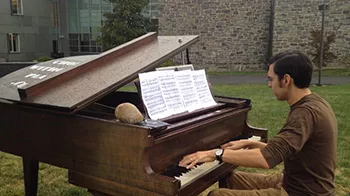Watch: Chopin Without Piano
Director Michal Zadara '99, actress Barbara Wysocka, and conductor Bassem Akiki discuss Chopin Without Piano.
Update:
Over the past six weeks, five baby grand pianos have been placed outdoors around campus, where they have caused a stir. They are part of Lost Pianos, a public music installation produced in connection with the North American premiere of Chopin Without Piano, a production that comes to the U.S. from Poland for its North American debut this week on campus and later this month at FringeArts in Philadelphia.
“Like the performance of Chopin Without Piano itself, the pianos are a provocation to help us think more deeply about the sustaining value of music, and the tradition of live classical performance," says Barbara Milewski, associate professor of music. "Reactions to these pianos thus far are a powerful indication, an argument even, that we are not yet ready to part with what these pianos represent: the tradition of music making in our homes, in our lives, and in our communities.”
To help build excitement for the premiere, Andrew Hauze '04 has performed several Mazurka Monday pop-up Chopin concerts in Parrish Parlors. Hauze, an instructor and director of performance, will perform one more on Mon., Oct. 19, at 12:45 p.m.

According to Milewski, the piano symbolizes our culture's connection to musical performance like nothing else. "As we worry perhaps about the wastefulness of decent pianos being destroyed by the elements," she says, "we must also confront the fact that we are complicit in the piano's declining presence in our lives. Our modern lives make listening to music an ever more individual experience. Ear buds in and iPods on, we forego shared music making and listening. These particular lost pianos, echoing the themes raised in Chopin Without Piano, serve as a striking reminder of that deep, ever more urgent human need for balance.”
Milewski also says Chopin's music is a meditation on time and still very relevant today. Read more.
Chopin Without Piano premieres on Sat., Oct. 24, at 8 p.m. and is free and open to the public. The following day at 3.p.m., Milewski will moderate a panel discussion on Chopin's music in performance featuring director and co-author Michal Zadara '99. Related events also include a performance by the Swarthmore Orchestra with guest conductor Bassem Akiki on Thurs., Oct. 22, at 7 p.m. All events take place in Lang Concert Hall.
Join the conversation @chopinwithoutpiano on Instagram, Twitter, and Facebook.
Original story:
Barbara Milewski’s first reaction to the news that Chopin Without Piano was coming to Swarthmore was excitement. The second was terror.
“It was, ‘Oh … we actually have to do this now,’” says the chair of the Department of Music and Dance, laughing. “‘What did we just get ourselves into?’”

Barbara Milewski
“This is the biggest project I’ve taken on since I’ve been here,” adds Allen Kuharski, chair of the Department of Theater. “An extraordinary collaboration of institutions and performers who wouldn’t ordinarily be in the same room together.”
The Pew Center for Arts & Heritage this week announced a $273,000 grant to bring Chopin Without Piano to the College and the city of Philadelphia in October. It’s an unprecedented opportunity for Swarthmore, says the faculty, in terms of scope and star power.
One of the College’s preeminent performing arts alumni, Michal Zadara ’99, comes back from Poland to direct. Wunderkind conductor Bassem Akiki makes his debut in America, and the esteemed Chamber Orchestra of Philadelphia offers its spin on the score.
Key to the Pew Center grant is forging partnerships with arts presenters in the Philadelphia region. After the production makes its international debut at Swarthmore in October, it moves to Fringe Arts, the epicenter of Philadelphia’s alternative theater scene in center city, which recently hosted the alumni-led Pig Iron Theatre Company.

Allen Kuharski
"Partnering with illustrious arts institutions such as Fringe Arts and the Chamber Orchestra of Philadelphia shines a spotlight on the high level of achievement of the performing arts at Swarthmore," says Milewski. "That Pew would trust the success of this collaboration speaks volumes about Swarthmore's vital role in a broader regional conversation about the meaning of the arts and culture in our daily lives."
Chopin Without Piano, itself, brings seemingly disparate elements together. Created by the Polish theater company CENTRALA co-founded by Zadara, it merges classical music with contemporary theater. This large-scale production replaces the piano parts from Fryderyk Chopin’s two piano concertos with a dramatic monologue performed by actress and CENTRALA co-founder Barbara Wysocka. It defies categorization — and expectations.
“This will expose younger audiences accustomed to contemporary and experimental theater to the classical form of the Chamber Orchestra,” says Kuharski. “And to bring the orchestra to Fringe Arts … that’s an exciting second half of the equation.”

Michal Zadara '99
By removing the piano score, the production invites more seasoned classical music audiences to focus on the mastery of Chopin’s orchestral writing, which has long been underappreciated, says Milewski.
"Chopin has a reputation as a composer of virtuosic piano music, and that has kind of put him in a restrictive box,” she says. “It may be a stretch to convince classical audiences otherwise, but I think when they hear his orchestral writing exposed in this way, they may be surprised to learn that what has historically been understood as compositional shortcomings may actually be revealed as intentional delicacy and individual formal experimentation. They’ll have a chance to hear the concertos with new ears.”
Thematically, the production offers insights on Chopin the historical figure, drawing upon fragments of his letters, biographies, and commentaries. It also asks important questions in contemplating how art can provide refuge and solace in turbulent times.
“It’s just awesome,” says Milewski. “It asks so many interesting and complicated questions, but it also offers the sheer beauty of a well-conceived work of art."
For the co-author of those questions, Zadara, this production provides the return to where his passion for Polish culture and theater took flight. He began studying those areas with Kuharski as an international student who had been educated in English-speaking schools. Twenty years later, Zadara is lauded for the specificity and variety of his Polish plays.

Andrew Hauze '04
“He’s just a unique phenomenon,” says Kuharski, “and Swarthmore was crucial to his development and putting him on this path. He mentions us in every program bio of every production he does all over the world.”
Zadara will pay that forward this fall through directing workshops with students at the College. There will also be acting classes with him and Wysocka and a master class with Akiki, as well as a panel discussion with the artists and host faculty about the interdisciplinary nature of the performance and its treatment of Chopin.
The Pew grant was matched by a $75,000 grant from the William J. Cooper Foundation and another $20,000 from the Adam Mickiewicz Institute in Poland. The faculty cites the efforts of the Development Office, as well, in preparing the grant proposal and helping to manage the complex process to bring the production to Swarthmore.
And what better place, says Andrew Hauze ’04, associate in performance, Music and Dance, to present it?
“This is on the cutting edge of drawing audiences in to what may feel like familiar territory before taking things in a completely different direction,” says Hauze, who reached out to and has coordinated with the Chamber Orchestra.
“It asks serious questions about the role of art and artists and musicians and actors and what it is to listen to classical music,” he adds. “That’s a question we’re always engaging with in the classroom, but this brings it right onto the stage of the concert hall for our community to consider in a direct way.”
Director Michal Zadara '99, actress Barbara Wysocka, and conductor Bassem Akiki discuss Chopin Without Piano.